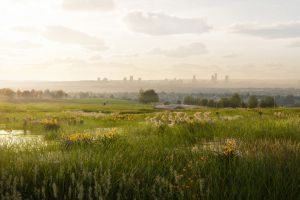Environment Bank secures conservation covenants for eight BNG Habitat Banks
- Eight BNG sites covering 500 acres secured under conservation covenants
- More than 800 Biodiversity Units now available to purchase from these sites
Environment Bank, the leading off-site Biodiversity Net Gain (BNG) provider, and RSK Biocensus, the ecological consultancy, announce a collection of BNG Habitat Banks1 to be secured under a conservation covenant so they can be added onto the national biodiversity gain sites register.
The eight BNG sites, created and managed by Environment Bank in partnership with rural landowners, cover almost 500 acres (almost 200 hectares) in total. These sites transform low-yielding farmland into nature recovery sites and maximise biodiversity uplifts, unlocking more than 800 off-site Biodiversity Units2 for developers to purchase. These sites will shortly be added to the gains site register and will almost double the number of sites on the national registry.
BNG not only contributes to national biodiversity objectives but also offers landowners a way to diversify their income streams, enhance their natural landscapes, and build business resilience for their farms.

Catherine Spitzer, CEO of Environment Bank said: “Working alongside local farmers and landowners, Environment Bank has 25 Habitat Banks already live, generating over 4000 Biodiversity Units. Securing legal agreements for these sites is the final step in unlocking the supply of Biodiversity Units. With developers required to ensure their projects benefit nature overall, this marks a significant milestone in the implementation phase. We have already sold Units to over 50 customers and received over £160m worth of enquiries. Now with supply unlocked, we can meet growing demand. This is a really positive step in helping this fledgling market thrive.”
Richard Pendlebury, landowner and farmer, Horwich Habitat Bank said: “Environment Bank’s model means that we’ll receive funding for a minimum of 30 years to manage the Habitat Bank. Such a guaranteed source of income is quite rare in the farming landscape, which is typically subject to constant change. We looked at Government schemes and they simply didn’t match what Environment Bank offered. This is an option that offers both certainty and a stable income for our family business for generations to come.”
Conservation covenant agreements with a Responsible Body are one of two types of legal agreements to secure land for Biodiversity Units. The other is a planning obligation (section 106) with a local planning authority (LPA). Developers are required by law under the Environment Act 2021 to ensure that all significant developments must deliver a minimum 10% increase in biodiversity, and they can do so by purchasing Biodiversity Units from Habitat Banks created off-site.
Environment Bank enables the delivery of this legislation by providing developers with Biodiversity Units from their dedicated BNG Habitat Banks, which are fully forward-funded over a period of 30 years. Landowners can now secure a reliable source of additional income by establishing Habitat Banks and generating these Biodiversity Units on their land. After achieving the revenue target for a Habitat Bank, any additional revenue generated will be shared equally between the landowner and Environment Bank.
The eight BNG sites secured under conservation covenants include:
- Minting Habitat Bank, Lincolnshire
- Heacham Habitat Bank, West Norfolk
- Martley Habitat Bank, Worcestershire
- Emberton Habitat Bank, Buckinghamshire
- Bolsterstone Habitat Bank, South Yorkshire
- Cornwell Habitat Bank, Oxfordshire
- Horwich Habitat Bank, Greater Manchester – Site 1 (One of two BNG sites at this location)
- Horwich Habitat Bank, Greater Manchester – Site 2 (One of two BNG sites at this location)
Landowners who are interested in exploring how a Habitat Bank could benefit their land and to deliver the greatest benefits for years to come, visit: https://environmentbank.com/registry/landowners/
- Log in to post comments

